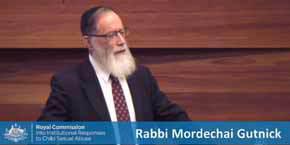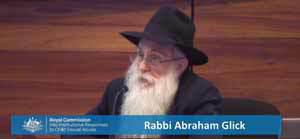|
Royal Commission into Institutional Responses to Child Sexual Abuse: Day 9
J-Wire
The Commission has extended its times of operation to accommodate all those scheduled to give evidence and the first to do so today was Melbourne’s Elwood Synagogue’s Rabbi Mordechai Gutnick. Rabbi Mordechai Gutnick told the Commission that he had grown up with jailed offender David Cyprys’s father and that David Cyprys, now serving an 8-year sentence, had served on the Board of the Elwood Shule. He resigned at the time of being charged. Rabbi Gutnick told the Commission about the cultural differences between his modern orthodoxy congregation and the ultra-orthodox Yeshivah kehilah. He said: “There is a greater emphasis on strictness of performing the various Jewish rituals in the Chabad community that there may be in the ordinary orthodox community. They both keep the same laws but our congregation will have people who are not that observant.” He agreed with Maria Gerace, the Counsel assisting the Commission that the Yeshivah community was more “insular”. When asked by Ms Gerace if Rabbi Groner or Rabbi Glick had called him on the rumours about David Cyprys to discuss his Board member, Rabbi Gutnick replied “No” adding that he first heard the allegations about Cyprys interfering with children was in 2010 or 2011. He said that he was told by a Board member about Cyprys and said that he “confronted him immediately asked him to tell me what was going on”. He said that Cyprys denied everything and that he knew he had been charged with something “in younger years” and that “he never explained what that was”. Referring to the halachic position on child abuse, Rabbi Gutnick was asked “Is it fair to say that the RCV felt it important to address that directly in their resolution so as provide guidance to the rabbinate and others about how it might respond. He replied: “Definitely” He agreed with Ms Gerace when she said that potentially beliefs as to what the halachic position was might lead to confusion. Rabbi Mordechai Gutnick, in referring to David Cyprys being on the Board of the Elwood Shule, said: “Victims would look at the fact that he was on the board as being outrageous and on the other hand I was very conscious of the fact that every one is innocent until proven guilty”. It was suggested that Cyprys could have stood down or been suspended. Rabbi Gutnick said that adding to the mix Cyprys’s presence in the Shule, even to pray, created a dilemma for him at the time. Cyprys did in fact stand down but Rabbi Gutnick voiced that the dilemma still stood – “Do we allow him to pray in our synagogue”. Ultimately, the synagogue issued a set of conditions to Cyprys as to when he could attend the synagogue. The letter told Cyprys that he could attend synagogue in the morning and the evening, that he would not be accorded any honour, that he was to leave the synagogue at the conclusion of the service and not linger and speak with others, that he should sit at the back of the synagogue in a corner and not engage in social interchange.” Cyprys was also told to consider praying at another synagogue on Shabbat so as “his presence doesn’t cause controversy amongst the guests”. He said at the time he felt they were doing the correct thing but that these days “we would do it differently”. Ms Gerace asked if he understands that a pedophile will protest his innocence vigorously. Rabbi Mordechai Gutnick spoke on T’Shuvah, the act of repentance. He said this was something between Man and God and no-one could ever be sure if another person had actually repented. Counsel for Manny Waks asked Rabbi Gutnick if he had approached her client directly. He said he had not and she responded “Do you wish you had?” He replied: “I was frightened. I’m a timid person and when I heard the anger people had I was afraid to approach him personally”. Melinda Roberts told Rabbi Gutnick that Manny Waks would have welcomed an approach at the time. Rabbi Gutnick said: “It was an opportunity lost.” Counsel for victims AVA and AVR Christine Hanscombe told Rabbi Gutnick that because Cyprys had “forced the criminal process” her clients had to give evidence in court. She said that resisting guilt and having her client appear in court revealed that Cyprys had not shown any repentance. Under questioning from counsel appearing for Manny and Zephania Waks, Rabbi Gutnick said that in today’s world he cannot think of any rabbi who would not agree that the correct procedure on hearing of a case of child sex abuse would be to go directly to the police. He said that that was his policy 40 years ago. He said that among rabbis of a previous generation “there were still some who were operating under the concept of you try to stick to Jewish law as much as you can”. He said they are “few and far between”. He added: “Common sense dictates you go to the police.” He was asked if a leader failed to report a sexual abuse incident to police or to act to restrict access by an alleged offender to children would either represent a grave wrong by that administrator. He replied: “It would be a serious offence.” He added: “Rabbis are accountable to their community.” At the end of his evidence Rabbi Gutnick made the following statement on behalf of the Rabbinical Council of Victoria.
This statement is issued on behalf of the Executive Committee of the Rabbinical Council of Victoria (RCV).
During the course of the Royal Commission of Inquiry into Institutional Responses to Child Sexual Abuse conducted this month we have been greatly disturbed at what could be perceived as a misrepresentation and/or misinterpretation of the attitude of the Victorian Rabbinate in general towards the issue of reporting and dealing with child sexual abuse. We wish to state quite unequivocally for the record:
The RCV pledges to continue to co-operate and work towards these goals to the very best of its ability. Rabbi Abraham Glick, the principal of the Yeshivah school at the time of the offences was next to give evidence. Rabbi Glick told the Commission: “I see that many mistakes were made. We should have responded better. Today things are very, very different. I would like to say to the victims if there is anything we feel we should still be doing I would value very much the opportunity to be able to help them move forward in the healing process. I personally would like to know. If I can do anything to help it would help me in my healing process. He told questioning counsel that he has not personally apologised to any of the eleven victims or offering counselling to the redacted [name withheld] victims of David Cyprys. Maria Garace, Counsel assisting the Commission set out the many factors that culminated in making the Yeshiva College in the period 1984-2007 a less than safe place for children. Rabbi Glick agreed with her. Regarding the email sent by ABV to the community encouraging people with information about child sexual abuse to go the police, Ms Garace asked Rabbi Glick if there was anything offensive or halachically wrong in the email. He answered in the negative. She continued: “Are you aware that Rabbi Telsner delivered a sermon shortly after that email was sent, criticising the sending of emails? “Do you know that ABV and others believe the sermon about not sending emails was directed at ABV? “I am not sure” he replied. “Having read that email could there ever be any justification for sending that email and comparing it to an episode in Jewish history?” she asked. Rabbi Glick was most reluctant to comment on someone else’s sermon as it was “unprofessional”. Ms Garace insisted on him answering and acknowledged how difficult it was for him. “I think the comparison is odious” said Rabbi Glick. More to follow
|
.
Any original material on these pages is copyright © BishopAccountability.org 2004. Reproduce freely with attribution.

